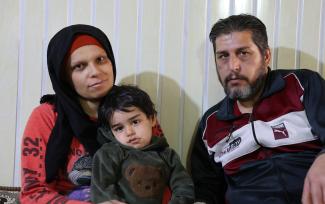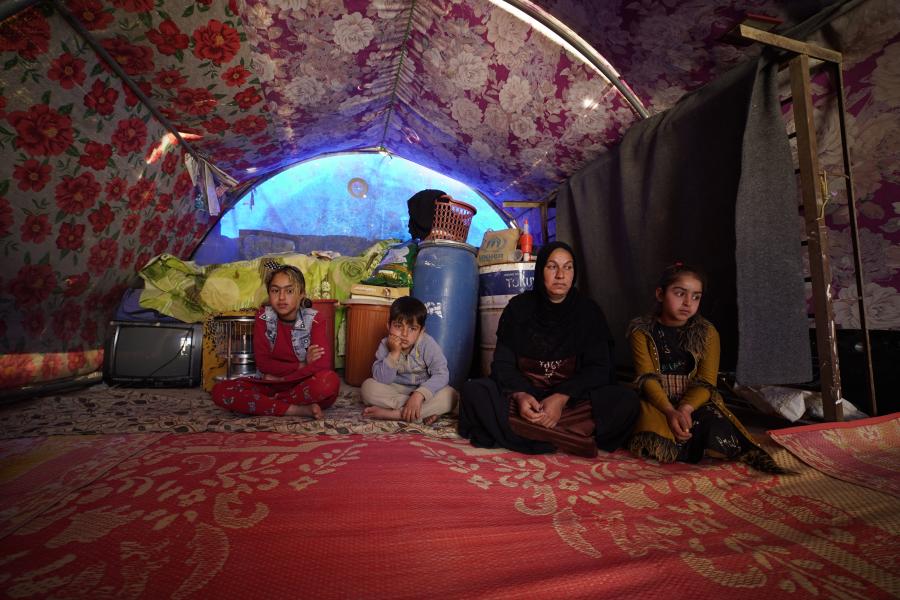2023 situation overview
In 2023, UNHCR’s operation in Iraq continued its transition away from an emergency humanitarian response and towards long-term interventions anchored in developmental approaches and the inclusion of displaced populations. UNHCR helped national systems to protect forcibly displaced and stateless people and helped those communities to mitigate risks, become more resilient, and resolve their situations of displacement or statelessness.
1.1 million Iraqis remained internally displaced, including almost 160,000 residing in 23 camps across the Kurdistan Region of Iraq (KR-I). UNHCR, on behalf of the humanitarian community, led on solutions for in-camp IDPs in cooperation with the Federal Iraqi Government and Kurdistan Regional Government (KRG), in line with the three solutions in the Inter-Agency Standing Committee’s “Framework for durable solutions for internally displaced persons”: sustainable reintegration, local integration and relocation/resettlement.
UNHCR supported IDPs’ access to civil documentation. It advocated in favour of assessing the eligibility of IDPs in camps for inclusion in the social safety nets of the Ministry of Labour and Social Affairs (MoLSA). It also pursued solutions for all IDPs in camps, from a safe and voluntary return home to local integration, including by transforming the camps into formal settlements.
In a breakthrough development, MoLSA took the decision in February 2023 to assess the eligibility of all IDPs in camps in the KR-I for its poverty reduction programme. IDPs meeting MoLSA’s vulnerability criteria (female-headed households, persons with disabilities) began receiving monthly cash payments (IQD 125,000 per person per month – approximately $95) to help them meet their basic needs.
UNHCR also advocated in favour of the full inclusion of refugees hosted in Iraq into the country’s social and protection services and policies, and in favour of enhanced economic opportunities for refugees. The Government has committed to include IDPs in the national cash assistance programme with federal funding and include refugees, IDPs and stateless individuals in national statistics from 2024, which will form a baseline for inclusion and a first step for aligning poverty analysis and development engagement.
More refugees were included in Iraq’s public education system in 2023. 49,900 Syrian refugee children, 70% of the total of school age, were enrolled in 1,500 public schools by late 2023; an increase of 11% when compared to late 2022. Furthermore, 400 refugees were included in poverty alleviation programmes.
UNHCR registered over 31,800 new asylum-seekers, 90% of whom were Syrian, facilitating their access to essential public services and protecting them against arbitrary arrest, detention or forcible returns.
UNHCR and partners also continued efforts to improve access to civil documentation and to address statelessness and risks of statelessness in Iraq. As a result of these efforts, it is estimated that more than 45,000 civil documents were secured by IDPs, IDP returnees and vulnerable Iraqis, almost 17,000 individuals attended legal awareness sessions on the importance of civil documentation and more than 50,000 people benefited from legal counselling services. Significant progress was also made in identifying and resolving the situation of stateless persons and those at risk of statelessness through surveys and legal assistance, resulting in a continued reduction of the estimated number of stateless people in Iraq.
UNHCR facilitated the resettlement of 1,243 refugees who had sought asylum in Iraq. Another 165 refugees departed through complementary pathways, mainly through family reunification. More than 200,000 Iraqi refugees and asylum-seekers remained in neighbouring countries at the end of 2023. UNHCR also supported Iraqi refugees in the region with third-country resettlement opportunities, securing 2,265 departures from across the region and Türkiye.
Throughout 2023, UNHCR, in collaboration with the KRG, supported camp management for 25 IDP camps (prior to two camp closures at the end of 2023), nine refugee camps, and one transit centre, which hosted about 180,000 IDPs and 95,000 refugees.
UNHCR completed 63 infrastructure projects, 12 of which were area-based protection and solutions interventions around Basirma and Domiz refugee camps as well as in IDP return areas. The area-based protection and solutions interventions varied from communal infrastructure, water supply and management, and solar energy, which allowed for increased access to livelihoods and more sustainable reintegration for IDPs through improved access to water and electricity. In total, 173,500 people benefited from the completed projects, including host communities.
Financial overview
More contributions information on previous years: Funding Update 2022 | Funding Update 2021
Legal assistance helps Syrian refugee get key documents and lifesaving treatment in Iraq
By Hamzeh Almomani in Erbil and Farha Bhoyroo in Baghdad, Iraq
During the first weeks of her pregnancy, Abeer felt constantly unwell, which raised concerns about her health. Finding out the criticality of her condition, she needed medical treatment. To receive any treatment she needed identity documents.
Read the story

